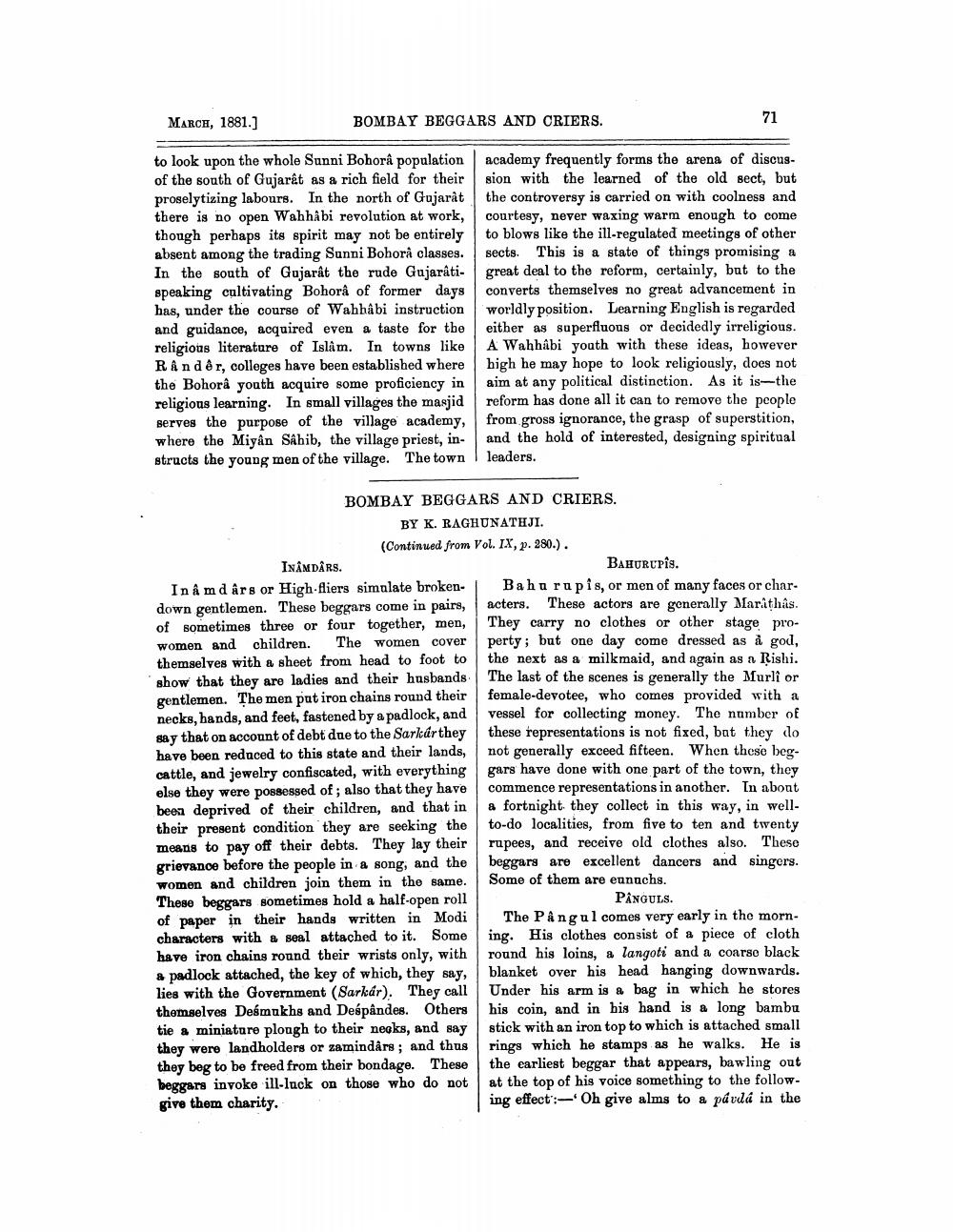________________
MARCH, 1881.]
BOMBAY BEGGARS AND CRIERS.
to look upon the whole Sunni Bohorâ population of the south of Gujarêt as a rich field for their proselytizing labours. In the north of Gujarat there is no open Wahhabi revolution at work, thongh perhaps its spirit may not be entirely absent among the trading Sunni Bohorâ classes. In the south of Gujarât the rude Gujaratispeaking cultivating Bohorâ of former days has, under the course of Wahhabi instruction and guidance, acquired even a taste for the religious literature of Islam. In towns like Rander, colleges have been established where the Bohorâ youth acquire some proficiency in religious learning. In small villages the masjid serves the purpose of the village academy, where the Miyan Sahib, the village priest, in- structs the young men of the village. The town
academy frequently forms the arena of discussion with the learned of the old sect, but the controversy is carried on with coolness and courtesy, never waxing warm enough to come to blows like the ill-regulated meetings of other sects. This is a state of things promising a great deal to the reform, certainly, but to the converts themselves no great advancement in worldly position. Learning English is regarded either as superfluous or decidedly irreligious. A Wahhabi yoath with these ideas, however high he may hope to look religiously, does not aim at any political distinction. As it is the reform has done all it can to remove the people from gross ignorance, the grasp of superstition, and the hold of interested, designing spiritual leaders.
BOMBAY BEGGARS AND CRIERS.
BY K. RAGHUNATHJI.
(Continued from Vol. IX, p. 280.). INÂMDÂRS.
BAHurupis. In âmd árs or High-fliers simulate broken-| Bahu rupis, or men of many faces or chardown gentlemen. These beggars come in pairs, acters. These actors are generally Marathas. of sometimes three or four together, men, They carry no clothes or other stage prowomen and children. The women cover perty; but one day come dressed as a god, themselves with a sheet from head to foot to the next as a milkmaid, and again as a Rishi. show that they are ladies and their husbands. The last of the scenes is generally the Murli or gentlemen. The men put iron chains round their female-devotee, who comes provided with a necks, hands, and feet, fastened by a padlock, and vessel for collecting money. The number of say that on account of debt due to the Sarkarthey these representations is not fixed, bat they do have been reduced to this state and their lands, not generally exceed fifteen. When these begcattle, and jewelry confiscated, with everything gars have done with one part of the town, they else they were possessed of; also that they have commence representations in another. In about been deprived of their children, and that in a fortnight they collect in this way, in welltheir present condition they are seeking the to-do localities, from five to ten and twenty means to pay off their debts. They lay their rupees, and receive old clothes also. These grievance before the people in a song, and the beggars are excellent dancers and singers. women and children join them in the same. Some of them are eunuchs. These beggars sometimes hold a half-open roll
PANGULS. of paper in their hands written in Modi The Pângul comes very early in the morncharacters with & seal attached to it. Some ing. His clothes consist of a piece of cloth have iron chains round their wrists only, with round his loins, a langoti and a coarso black & padlock attached, the key of which, they say, blanket over his head hanging downwards. lies with the Government (Sarkár). They call Under his arm is a bag in which he stores themselves Deśmukhs and Despândes. Others his coin, and in his hand is a long bambu tie & miniature plough to their necks, and say stick with an iron top to which is attached small they were landholders or zamindårs; and thus rings which he stamps as he walks. He is they beg to be freed from their bondage. These the earliest beggar that appears, bawling out beggars invoke ill-luck on those who do not at the top of his voice something to the followgive them charity.
ing effect':-Oh give alms to a páviá in the




